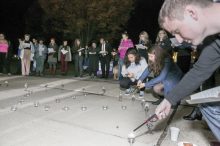Rallying for peace
When the world is divided, it is easier to target and oppress groups of people. To me, community is about showing up. It is about unity.
When women’s suffragists and abolitionists worked together, it was powerful, and justice prevailed. Justice and equality are not zero-sum scenarios in which only one party can win. Everyone can benefit from a more equitable world, where people can receive what they need.
Here at Wheaton, sometimes that need is support, whether that support comes from other students, staff, faculty or administrators. Ask and you can receive it. Sometimes you don’t even have to ask.
I am grateful that the Wheaton community is always looking to step up and be a safe and inclusive place. One example that stands out to me came forth in the days after the 2016 presidential election.
There were many media reports of an influx of violence toward marginalized groups of people. Hurtful rhetoric targeted and vilified many groups, including Muslims, immigrants and women. So I wanted to create a space on campus where we could come together regardless of our political affiliations and take a stand against the hate and violence threatening to shake our nation.
I wanted to promote peace, compassion and unity. I was able to do that by working with other students, staff and administrators to organize the Rally for Peace event.

Student Government Association President Katie Elliott ’17 and Wheaton College Conservatives President Michael Lethin ’17 both spoke to affirm the standards of our community, and Voices United to Jam led the gathering in a rendition of “Lean on Me,” as members of the crowd lit the candles. The Feminist Association of Wheaton collected donations for the American Civil Liberties Union. And the Reverend Bernard Hinckley gave a compelling speech about the need for compassion.
People went out of their way to work together and help create an event that connected together those on all ends of the political spectrum and those who carried many different identities.
We stood as a community and showed that we do not accept prejudice and intolerance, and we are here holding one another accountable so that everyone is safe and has support.
I am forever grateful that, despite what is happening outside of this small campus, I do not have to worry about how I am treated here. I am thankful for that privilege.
—Olivia Benissan ’19, sociology major
In their own words
A look at the collective effort of constructing connections or go back to Close-knit
Line by line
“Built by individual narratives, one at a time, the Unity Project provided us with a reminder of how communities are formed and reinforced by the unique individuals within them.”
Professor Kelly Goff
Talking about conversation
“We are a place about learning, generating new ideas and facing challenges. So we should be able to use that in response to social questions.”
Provost Renée T. White
Rallying for peace
“When the world is divided, it is easier to target and oppress groups of people. To me, community is about showing up. It is about unity.”
Olivia Benissan ’19, sociology major
Clear vision
“‘I see you’ is an important sentence for the 21st century, and building community is an essential task for the future, as, on a daily basis, we face interaction with diversity locally and around the world.”
Professor Russell Williams
One Wheaton
“Community is built daily through seemingly normal dialogue.”
F. Steven Kimball ’18, economics major
The work of shared responsibility begins within
“Accepting the evidence that the world is structured unfairly and that, unchecked, even our perceptions and behaviors can perpetuate that unfairness, allows us to work together toward change.”
Professors Michael Berg and Karen McCormack
Word by word
“As writers, we understand writing as a way to grapple: It allows an inner confrontation with what, on the surface, we cannot accept.”
Professors Constance Campana, Ruth Foley, Lisa Lebduska and Angie Sarhan
Fitting the pieces together
“As a neuroscience major, I recognize the interconnected nature of everything that I have become part of here at Wheaton. Yet, I am challenged to find the connections between the sciences and social justice issues.”
Kelvin Ampem-Darko ’17, neuroscience major
